Written by James Han, PhD Student, University Health Network, Maartje Wouters, PhD, Post Doctoral Fellow, BC Cancer Agency, and Megan Mahoney, PhD, Manager of HQP Training Programs, BioCanRx
The 3rd Annual Summit for Cancer Immunotherapy (Summit4CI) that took place in Banff, AB, October 27-30, 2018, was a huge success! This year, we offered training opportunities oriented toward undergrad and graduate students, postdocs and other technical, clinical and research staff involved in bringing promising cancer biotherapeutics to clinic – all Highly Qualified Personnel (HQP) in BioCanRx’s Community!
Preclinical Experimental Design and Reporting Workshop
This year‘s Preclinical Experimental Design and Reporting Workshop took place as a pre-Summit day-long event. Participants were Network Investigators, HQP and Network Partners. The workshop aimed to improve BioCanRx scientists’ knowledge of research design, analysis, and reporting of key methodological details according the NIH and ARRIVE standards. The workshop was developed and designed by BioCanRx and the BluePrint Translational Group at the Ottawa Hospital Research Institute (OHRI). Workshop presenters included Network Investigators Drs. Manoj Lalu, Dean Fergusson and Carolina Ilkow of the OHRI, along with Dr. Carly Barron of McMaster University and Josh Montroy, a Clinical Research Associate from OHRI. Thank you to Novartis for providing unrestricted support of this event!
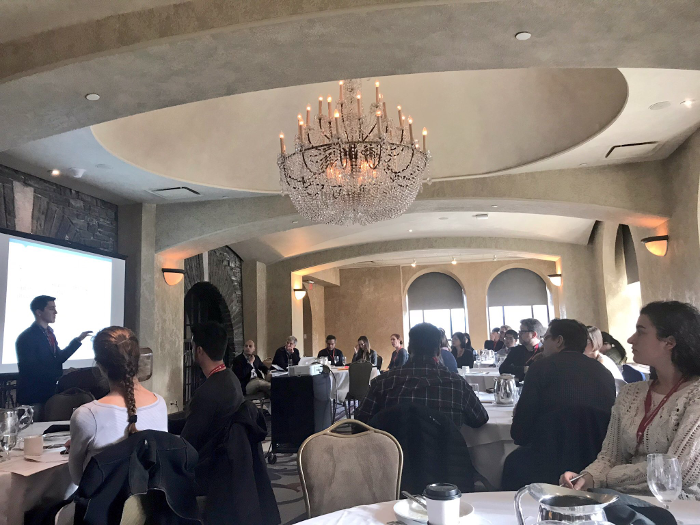
HQP-Specific Activities!
HQP Trainee Day
On Saturday we kicked off the Summit4CI with a special HQP trainee day. Trainees were invited for a networking lunch after which Dr. Chris Nicholls, of Merck Canada, gave a talk on his role in the company and revealed some interesting career options for trainees. The keynote of the day was addressed by Dr. Jeffrey Hoch who gave a great, funny talk about health technology assessment in which he explained what is special about the Canadian health care system in that regard.
After these plenary talks, trainees were offered various workshops by four amazing speakers.
In the times of mass communication, it becomes more and more important to be able to communicate research with peers as well as non-peers. Dr. Barbara Vanderhyden provided useful tips and exercises on how to communicate with the public and media and presented some examples of successes she achieved by her outreach activities.
For public outreach, as well as presenting data in the scientific setting, graphics are an important tool to get your message across accurately. Dr. Frank Delaglio presented examples of good and bad graphics, and, importantly, ways to improve the bad examples.
Glenn Lesko gave trainees insights into the life sciences job market to help understand what job opportunities exist in the biotech sector. The interactive session also focused on tips and strategies of searching for a job and navigating through an early career.
Once the job opportunities are clear, the next step is to be invited to interviews. For this, CV and resume writing is essential. Dr. Stephanie Eberle gave examples of successful and not so successful ways to convince employers and set candidates apart from others.
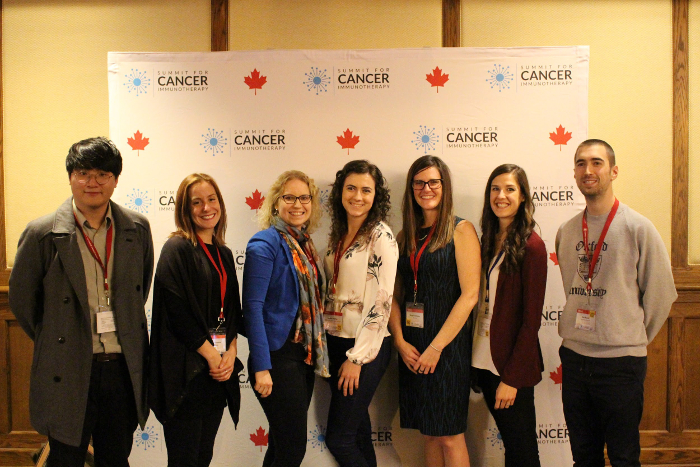
HQP Working Group (from left to right): James Han, Marie-Laurence Tremblay, Maartje Wouters, Hayley McKay, Megan Mahoney (BioCanRx Manager of Training Programs), Brittany Umer, Robert Mould.
Meet the Experts
BioCanRx encourages opportunities for HQP members to network with experts from various sectors. During this session, HQP had the opportunity to “speed date” in small groups with 12 professionals (“Experts”) who represented various careers and job sectors relevant to HQP. Some of the speakers included Dr. Christine Williams (Deputy Director of OICR), Dr. Brad Nelson (Scientist, BC Cancer Agency), Dr. Scott McComb (Research Officer, NRC), Dr. Bruce Seet (Director of Medical Affairs, Sanofi Pasteur), and many more. The program was well-received by both the expert panel as well as the HQP trainees who attended the program.
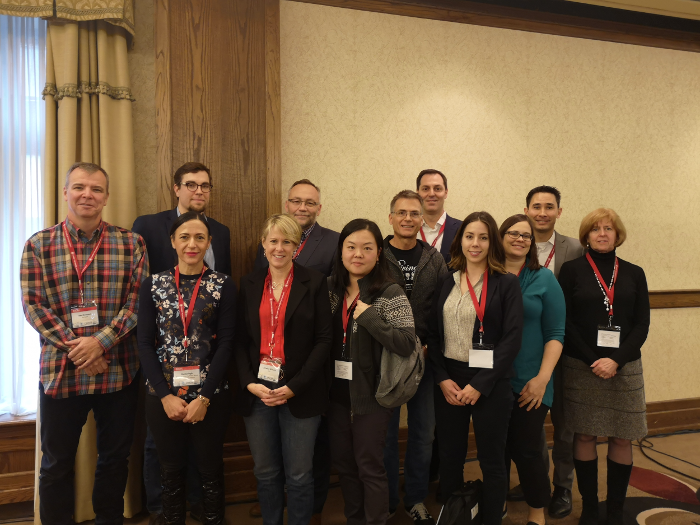
The Learning Institute (HQP perspective)
The BioCanRx-Cancer Stakeholder Alliance (CSA) Learning Institute aimed to engage patient scholars with academic scholars (comprised of HQP members) through interactive activities which guided the process of knowledge synthesis, dissemination and exchange. The Learning Institute activities spanned throughout the BioCanRx conference (in addition to pre- and post- conference meetings), and provided opportunities for HQPs to 1) break down complex scientific ideas for patient scholars, and 2) understand the process of research translation from the patient perspective. The Learning Institute provided unique experiences for trainees to engage in translational research beyond the lab setting.
Plenary and Poster Sessions
Summit4CI had seven plenary sessions in which fantastic research was presented. In each plenary, a selected HQP trainee presented their work. Furthermore, there were two speed poster sessions, in which 24 trainees convinced the audience in two minutes to visit their posters. In total 112 HQP presented posters during the two poster sessions, which were well-attended and provoked much discussion.
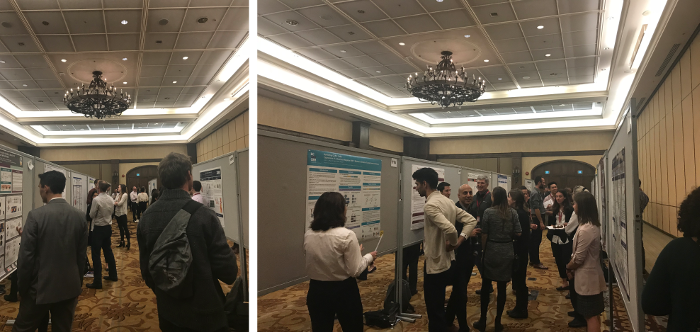
Awardees
This year, 10 HQP were awarded for best poster presentations, speed poster presentations, and oral plenaries. New this year, the Cancer Stakeholder Alliance Working Group, BioCanRx’s patient engagement and advocacy consortium working group, judged and adjudicated an award to the top oral plenary for accessibility and presentation of their research. For a list of awardees, please see below.
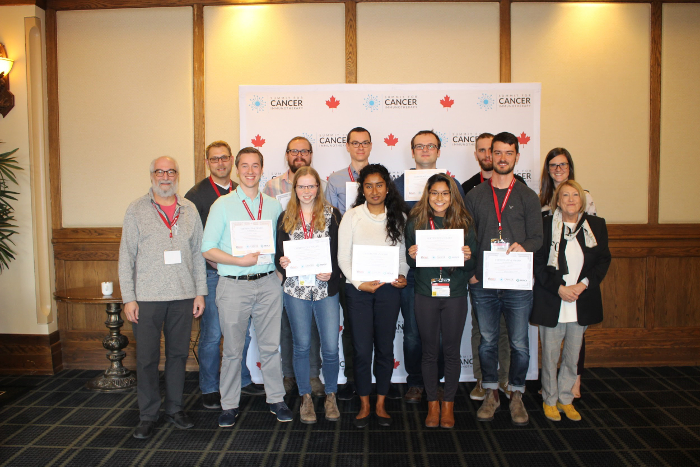
Top oral plenary presentation (adjudicated by technical experts)
Abera Surendran, PhD. Student, University of Ottawa
Understanding the role of adipose tissue and fat cells in the tumour microenvironment and its impact on the oncolytic virus therapy responses
Top oral plenary presentation (adjudicated by the Cancer Stakeholder Alliance Working Group)
Adam Nelson, Post Doctoral Fellow, Dalhousie University
Natural killer T cell activation in combination with oncolytic vesicular stomatitis virus expressing IL-15 induces pancreatic tumor regression in syngeneic mice
Top speed-poster presenters
Christopher May, PhD Student, BC Cancer Agency
Overcoming immune suppression mediated by indoleamine 2,3-dioxygenase in adoptive cell therapies
Julian Smazynski, PhD Student, BC Cancer Agency – Trev and Joyce Deeley Research Centre
The TIGIT:CD155 axis as a potential checkpoint pathway in immunologically cold ovarian cancers.
Top undergraduate poster presenter
Analyssa Cardenas, Ottawa Hospital Research Institute
Identifying barriers and facilitators to improving reporting and reducing risk of bias in preclinical studies
Top 3 graduate student poster presenters
Adrian Pelin, PhD Student, Ottawa Hospital Research Institute
Poxvirus genome editing in the development of a safe and efficient oncolytic platform
Israel Matos, PhD Student, University of British Columbia
Systems level mass cytometry reveals that tumour-derived G-CSF induces immunosuppression and poses a barrier to immunotherapy
Katherine MacDonald, PhD Student, University of British Columbia
Expansion of thymus-derived regulatory T cells using GMP-compatible reagents
Top 2 post-doctoral fellow or research associate poster presenters
Mathias Leber, PhD, Post Doctoral Fellow, Ottawa Hospital Research Institute
Genetic Alterations Acquired by Oncolytic Measles Virus During Extended Replication
Scott Walsh, PhD, Post Doctoral Fellow, McMaster University
Endogenous T cells prevent tumor escape due to antigen loss following adoptive T cell therapy